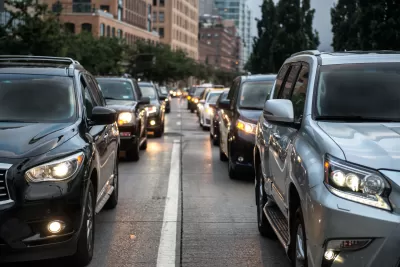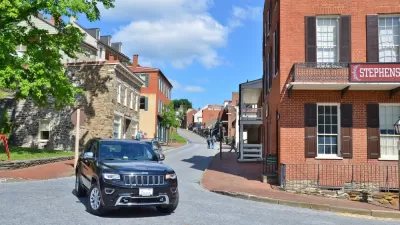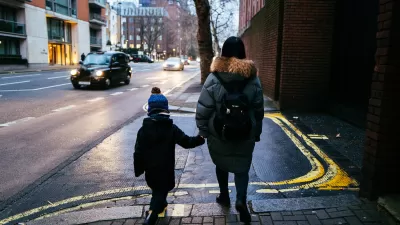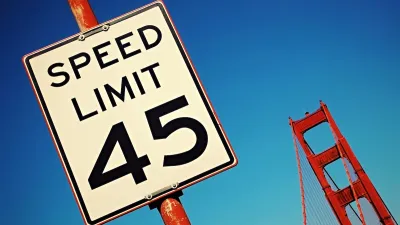The proposed fee hike would more accurately reflect the increased risk to pedestrians posed by heavier vehicles.

New York drivers could soon pay higher registration fees on heavier vehicles as part of an effort to reduce the pedestrian deaths and the strain on infrastructure caused by larger and heavier SUVs. Alissa Walker describes the proposed bill in Curbed.
According to Walker, “New York State already charges weight-based registration fees, but they’re laughably low. Currently, the owner of a 2,877-pound Honda Civic pays $47 every two years, while the owner of a vehicle twice that weight pays $112.50. These fees don’t reflect, in any way, the potential damage that such an increase in weight presents.”
The new legislation would more accurately reflect the increase in risk, Walker writes, adding that “one study estimates that for every 1,000 pounds of vehicle weight, the chance of fatality increases by 46 percent.” The new fees would be implemented over the next six years. “The new fee would only apply to passenger vehicles — drivers who use large vehicles for work can apply for a commercial registration, and all the SUVs purchased by the NYPD, for example, would be unaffected.”
Walker notes that heavier vehicles can cause damage to roads and buildings, pointing to the collapse of an Ann Street garage earlier this year, a problem that will only be exacerbated by the weight of electric car batteries.Three quarters of revenue raised from the bill would, after fulfilling annual dedications, fund safety improvements for bikes and pedestrians.
FULL STORY: You May Soon Have to Pay More to Drive That SUV in New York

Planetizen Federal Action Tracker
A weekly monitor of how Trump’s orders and actions are impacting planners and planning in America.

San Francisco's School District Spent $105M To Build Affordable Housing for Teachers — And That's Just the Beginning
SFUSD joins a growing list of school districts using their land holdings to address housing affordability challenges faced by their own employees.

The Tiny, Adorable $7,000 Car Turning Japan Onto EVs
The single seat Mibot charges from a regular plug as quickly as an iPad, and is about half the price of an average EV.

Seattle's Plan for Adopting Driverless Cars
Equity, safety, accessibility and affordability are front of mind as the city prepares for robotaxis and other autonomous vehicles.

As Trump Phases Out FEMA, Is It Time to Flee the Floodplains?
With less federal funding available for disaster relief efforts, the need to relocate at-risk communities is more urgent than ever.

With Protected Lanes, 460% More People Commute by Bike
For those needing more ammo, more data proving what we already knew is here.
Urban Design for Planners 1: Software Tools
This six-course series explores essential urban design concepts using open source software and equips planners with the tools they need to participate fully in the urban design process.
Planning for Universal Design
Learn the tools for implementing Universal Design in planning regulations.
Smith Gee Studio
City of Charlotte
City of Camden Redevelopment Agency
City of Astoria
Transportation Research & Education Center (TREC) at Portland State University
US High Speed Rail Association
City of Camden Redevelopment Agency
Municipality of Princeton (NJ)





























